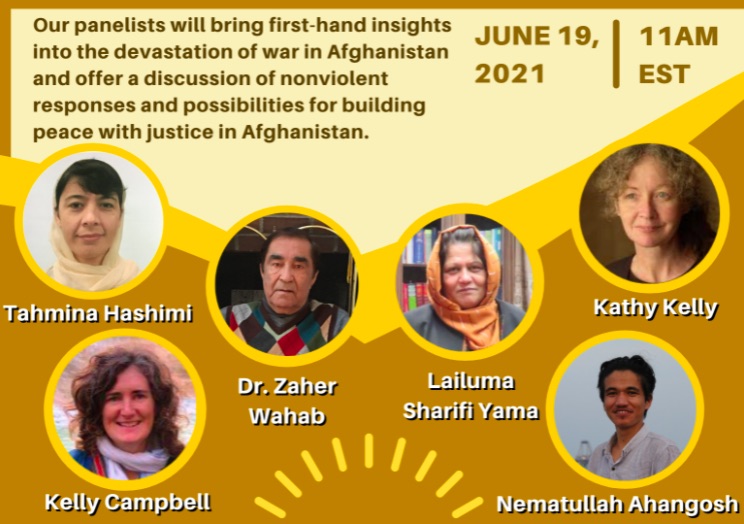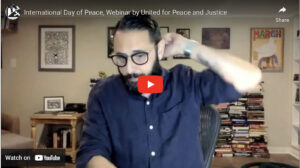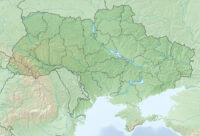September 11th Families for Peaceful Tomorrows was organized after four of its founding members returned from Afghanistan in January of 2002 having witnessed the devastating levels of civilian casualties caused by the military activities of the U.S./NATO coalition. One of the organization’s earliest actions was to publicize their findings in a document shared with Congress and members of the Bush Administration: AFGHAN PORTRAITS OF GRIEF—The Civilian / Innocent Victims of U.S. Bombing in Afghanistan.
In the following two decades, Peaceful Tomorrows’ members have traveled many times to Afghanistan developing close ties with members of Afghan civil society. Four of them—Dr. Zaher Wahab, Tahmina Hashimi, Lailuma Sharifi Yama, and Nematullah Ahangosh—joined Kelly Campbell, a founder of Peaceful Tomorrows and Kathy Kelly, long-time peace activist who has been working with the Afghan Youth Peace Volunteers in Kabul since 2010 to discuss the role of civil society actors in peacekeeping, obtaining reparations, and building peace with justice for Afghanistan.
You can view the WEBINAR HERE using this PASSWORD: R^ftP#7v
Afghan civil society activists have richly informed the work of Peaceful Tomorrows over many years. All the Afghans participating in the webinar described an important expansion of opportunities for civil society engagement especially for women, since 2002. Yet, Tahmina Hashimi emphasized that women in the cities enjoy most of these opportunities and that much work remains to be done to empower rural women, who make up 80% of the female population. Lailuma Sharifi Yama echoed and elaborated on Hashimi’s remarks.
Nematullah Ahangosh shared a very moving story; an activist and poet who is afflicted with muscular dystrophy, Ahangosh has been inspired by his own life to work with children now disabled as a result of war injuries. He also recited one of his poems about what education means for Afghan youth and the heartbreak of seeing one’s school destroyed amidst war. Like the other Afghans, Ahangosh expressed great concern that recent advances by civil society are now in jeopardy as U.S./NATO troops leave and the Taliban reclaims territory.
While all the Afghans agreed that it was time for the coalition forces to depart, they felt that there had been insufficient planning for how withdrawal would affect the Afghan people and government. Dr. Zaher Wahab offered a proposal: he argued for a peacekeeping force under U.N. auspices. He emphasized strongly that this peacekeeping force should be comprised of troops from nations that never participated in the coalition, but that the U.S. and NATO nations had to pay for the effort.
Kathy Kelly began her remarks observing many might doubt that there was money to finance the effort Dr. Wahab described, but she pointed out the U.S. has just appropriated $10 billion for a Biden Administration program, “Over the Horizon,” which plans to continue aerial attacks in Afghanistan after troops depart. She went on to criticize the lack of concern for the impacts of our war among the U.S. public and gave examples of how bombings and drone strikes have decimated critical infrastructure, including hospitals, and caused extensive civilian casualties even when U.S. forces have been informed in advance of planned civilian movement and activities. Yet Kelly emphasized, despite Afghanistan being a corrupt, failed “narco-state,” the agricultural systems could be rehabilitated and people could return to being self-sufficient.
Kelly Campbell concluded the panelists’ presentations recalling how in the days that Peaceful Tomorrows organized it was nearly impossible to speak out publically in opposition to war in Afghanistan. She celebrated Representative Barbara Lee’s singular vote in Congress to oppose that war. Campbell also remembered how in January of 2002 the Afghans she met thought the war was over and the U.S. would remain to support the people in building a future of their own hopes and vision, but that support never materialized. Campbell concluded that it was long past time to abandon all military solutions and adopt radically new approaches to finding peace in Afghanistan.
Again, you can view the WEBINAR HERE using this PASSWORD: R^ftP#7v
September 11th Families for Peaceful Tomorrows was also highly critical of the Obama Administration’s emphasis on the war in Afghanistan as “the good war,” and published an extensive critique, “Afghanistan: Ending A Failed Military Strategy” as well as a shorter organizing leaflet. Tragically, most of the arguments in these two documents remain as relevant today as they were in 2008.



